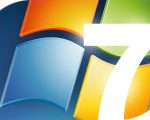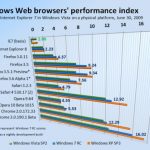Report: Evidence of further creativity with Windows 7 upgrade prices

As first noted by ZDNet blogger Ed Bott this morning, at least one online software retailer has posted a listing for a Microsoft Windows 7 product corresponding to what bloggers earlier this week had speculated upon: a three-license discount package for purchasers of Windows 7 Home Premium.
The listing from Utah-based Expercom clearly shows something being called "Windows 7 Family Pack/Home Premium Upgrade," with a price of $136.95. While this could be a multiple license package as many suspect, the other possibility is that it's some kind of extra software bundle. However, there's not much else that Microsoft sells shrink-wrapped these days at a price point at or around $37.
The battle ahead: Google Chrome OS vs. Microsoft 'Windows 8'

For Google to emerge as a true contender in just the field of netbook operating systems as soon as 2011 will require it to have smoothly and swiftly cleared an immense obstacle course first. But just the fact that Google will make the attempt will underscore a hard new reality facing Microsoft, one which my friend Carmi Levy pointed out on Monday: The rules of the game for operating systems and applications are changing rapidly, and their underlying principles are being rewritten.
Now, we can adopt Google's quaint little prophecy and sing praises -- perhaps to the tune of "It's a Small World After All" or, if you prefer to go really over the top, "The Battle Hymn of the Republic" -- to the notion that "The Web is now the platform." In our hearts, we may hope for that to be true; in our minds, we all know that's rubbish, holding as much water as Intel's and Microsoft's 1980s notion that x86 architecture "is the platform." There is no single platform for online applications, and whether there ever will be is still a matter of some debate. At this rate, it's not happening.
It's official: Google Chrome, the operating system

Well, this answers the question about why no Android for netbooks. In a stunning announcement late Tuesday evening, the company that for years had been suspected of developing an operating system but which had never entirely denied the claim, has come out with it: Yes, Google is making a Linux; yes, it's for netbooks (at least for now); no, it's not Android.
"Google Chrome OS is a new project, separate from Android," reads yesterday's company blog post from VP Sundar Pichai and Engineering Director Linus Upton. "Android was designed from the beginning to work across a variety of devices from phones to set-top boxes to netbooks. Google Chrome OS is being created for people who spend most of their time on the Web, and is being designed to power computers ranging from small netbooks to full-size desktop systems. While there are areas where Google Chrome OS and Android overlap, we believe choice will drive innovation for the benefit of everyone, including Google."
Web royalties compromise means fee hike for Pandora, perhaps others

The proprietors of online streaming radio, including Pandora's Tim Westergren, are finding themselves surprised today to be cheering an agreement with performance rights holders that has them paying as much as 25% of their revenue in royalties. But that's better than all of their revenue, which was a literal possibility in 2007, and better than 70% which Pandora and other services were paying at this time last year.
Under the new deal announced today, webcasters are being offered a so-called "alternative set of rates and terms" by SoundExchange, the organization responsible for managing performers' royalties in the US. Those that agree to SoundExchange's terms must adopt a new and more rigorous reporting schedule for reporting their revenues right down to the dollar -- the reporting system that SoundExchange insisted upon two years ago. It's an even more rigorous reporting system than what the US Copyright Royalty Board agreed to last January, when it made a reluctant U-turn in favor of revenue-based royalties accounting.
Firefox 3.5 vs. Chrome 3 Showdown, Round 3: Finding a place for more tabs

Download Google Chrome for Windows Beta 3.0.191.3 from Fileforum now.
With Web pages having evolved into Web sites and moving on to become Web applications, we find ourselves frequently revisiting the question of what a Web browser tab should represent. In researching a topic for multiple stories during the course of a day, I often find myself with as many as a hundred tabs open at one time. And yes, I try to keep them in some kind of order, which is never easy; and when the browser crashes (as it still often does), recovering all those open tabs is becoming more difficult, it seems, as time goes on.
Complaints against EU open source agenda may overlook a policy breakthrough

A European Commission policy review white paper released last week (PDF available here) was brought to light in the US this week by virtue of a comment from its most vocal opposition. Yesterday, press sources including IDG's Paul Meller quoted the Association for Competitive Technology's Jonathan Zuck as taking sides -- not surprisingly -- against the white paper, accusing the EC of bias in favor of open source software producers over commercial manufacturers.
"We remain concerned that the policy framework suggested in the white paper seems to favor open source software over proprietary software to achieve more interoperability," reads another citation of Zuck's statement. Ironically, Zuck's ACT Web site from which the statement originated appeared to be the victim of a crash in its open source asset management system this morning, so only second-hand citations of Zuck were available today.
Microsoft moves C#, .NET CLI to community license, helps Mono

In an announcement yesterday, Microsoft representative Peter Galli (a former ZDNet blogger) told the company's shared source community that it's decided to make its C# programming language and the Common Language Infrastructure model that makes C# programs run in the .NET Framework, available under the company's unilateral Community Promise.
As a result, it may become feasible for anyone to build a C# interpreter and a compatible CLI, or even a C# low-level compiler -- not even necessarily for Windows -- without having to pay Microsoft a fee. The implementer now need only promise in turn not to take IP infringement actions against Microsoft, essentially accepting that the technology is Microsoft's to give away.
"The Promise applies to developers, distributors, and users of Covered Implementations without regard to the development model that created the implementations, the type of copyright licenses under which it is distributed, or the associated business model," Galli wrote.
Don't wait for Microsoft's patch: Secure Windows now from Monday's 0-day

There's an old ActiveX control hanging around many Windows systems that's still accessible to Internet Explorer, whose original purpose was to tune into MPEG2 transport streams -- typically live video streams sent from a server using MPEG2 format. Yes, MPEG2 transport streams still exist, but any more, browsers including IE8 have appropriate plug-ins to handle them -- Windows Media Player is one, Apple's QuickTime is another.
But still there's this ActiveX control sitting there doing nothing, waiting to be leveraged for an attack. Earlier today, Microsoft acknowledged a SANS Internet Storm Center report saying that there's an active exploit of this disused bit of functionality published on Chinese Web sites. Apparently malicious users are utilizing it now in "drive-by" attacks that could result, say security experts including Sophos' Graham Cluley, in installation and execution of nearly any malicious payload.
Firefox 3.5: The need for speed

All throughout the testing phase of Mozilla's Firefox 3.5, we've been tracking the often very granular, very minor speed tweaks that developers have been making to the browser -- a one percent improvement here, a two percent dip there. And some of our readers have been wondering why. With computers that are already fast enough for many consumers, will it matter much that Google Chrome completes some operations in two blinks of an eye versus Firefox's three blinks?
We posed those questions to two of Mozilla's browser engineers: Senior Director for Platform Engineering Damon Sicore, and infrastructure developer Vladimir Vukicevic. Their answers include items we can share with you directly, and demonstrate to you explicitly.
'GeoHot' gets a shower, cleans up nice, reveals new iPhone 3G S jailbreak

In a comically blatant display of bravado this morning, George Hotz -- who gained fame last year as the first to post an unlocking utility for the new Apple iPhone -- has unveiled a new utility that he claims enables iPhone 3G S users to download, install, and utilize the applications of their choice, outside of Apple's and AT&T's control.
In so doing, Hotz -- who uses the handle "GeoHot" -- publicly paraded his prowess in front of Dev-Team, the independent group of iPhone developers who had been racing to produce a similar tool for this latest model. Complete with poor punctuation and curious references to "holes," Hotz wrote, "Normally I don't make tools for the general public, and rather wait for the dev team to do it. But guys, whats up with waiting until 3.1? That isn't how the game is played. We release, Apple fixes, we find new holes. It isn't worth waiting because you might have the 'last' hole in the iPhone. What last hole...this isn't golf. I'll find a new one next week."
Why would Windows 7 customers spend $120 more for BitLocker?

The fact that Microsoft will continue to offer consumers multiple versions of Windows when the company's new Windows 7 premieres on October 22, continues to stick in the craw of many who doubt there's any real demand for a less-than-complete edition of the operating system. Retailers continue to require a three-tier marketing approach, although Microsoft's choice of the name "Home Premium" this time around to refer to the lesser of its good/better/best tiers, continues to raise eyebrows.
But the questions about what's so Ultimate about "Ultimate" have only resounded more loudly, especially after CNET's Ina Fried brought the issue to a head early this morning. Since the only two differences that Microsoft's Web page mentioned between the Professional and Ultimate editions are the inclusion of BitLocker drive encryption and the multiple language pack (typically included with Windows' business licenses), prospective customers are asking what it is that makes Ultimate really worth $120 more than Professional.
Dish users may continue using DVRs as appeals court stays injunction

As first reported by Dow Jones this morning, the ongoing technology infringement battle between DVR pioneer TiVo and Dish Network has only entered yet another new chapter. A federal appeals court early this morning granted Dish Network's request for a stay of an injunction that would have barred the continued sale and use of Dish's DVRs, after a district court ruled last month they infringed upon TiVo's patents for timesharing technology.
The stay does not mean that Dish is out of the woods. An appeal of last month's decision was inevitable, and courts will typically delay injunctions pending appeal, even if it ends up that the appeal is upheld.
A Michael Jackson post-mortem on Internet journalism

The first I heard of Michael Jackson's death was six minutes before he was pronounced dead. That's saying something, because I'm not exactly the expert on pop culture, so my ability to have prognosticated the near future, based on something a little bird told me, on the subject of a fellow I seriously believed was still living in Tokyo, would normally be suspect. But there it was, in one of my IM feeds at about 5:20 Eastern time last Thursday, "Michael Jackson died."
My friend and colleague Angela Gunn suggested last Friday that something changed in the fabric of online journalism that day -- a high water mark had at last been reached. And indeed she may be correct, because if this Internet thing is capable of predicting the future even six minutes down the road, then I may want to get into the stock trading business.
The final score: Firefox 3.5 performs at 251% the speed of 3.0

Download Firefox 3.5 Final for Windows from Fileforum now.
For a good part of Tuesday, the Web Standards Project's Acid3 testing server was offline. With it went 25% of our browser performance testing capacity, which kept us from being able to publish our initial Mozilla Firefox 3.5 performance index as originally planned. As Acid3 started coming back, browsers were posting curiously low scores (for instance, Opera 10 Beta below 100%) that led us to dispute the test more than the browser.
New beta of iPhone 3.1 SDK shows signs of life for MMS on AT&T

Registered developers who log onto the Apple Dev Center this morning are being given an interesting little message (and 9to5Mac.com has a screenshot): With the iPhone 3.0 SDK having just been released, the first beta of the version 3.1 SDK began distribution last night.
Perhaps topmost on the list of iPhone 3.1 features that developers have been searching for, but were denied with the 3.0 release, is evidence that instant messages may at last include MMS. This blogger shows screenshots of images that can be cut-and-pasted to the text entry line, which implies that they can be sent using MMS protocol...at some point. AT&T has not enabled that protocol over its network yet, though the carrier is saying it will enable that feature this summer.
BetaNews, your source for breaking tech news, reviews, and in-depth reporting since 1998.
© 1998-2025 BetaNews, Inc. All Rights Reserved. About Us - Privacy Policy - Cookie Policy - Sitemap.
